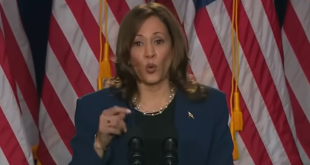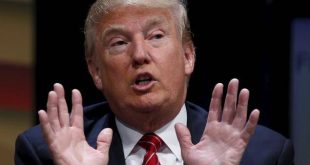Gov. Ron DeSantis of Florida woke up in Iowa with a familiar political headache.
The man he is chasing in the polls, Donald J. Trump, had just been disqualified from the ballot in Colorado in yet another legal assault that Mr. Trump leveraged to cast himself as a victim. And so Mr. DeSantis trod carefully the next morning outside Des Moines when he called Mr. Trump a “high-risk” choice, alluding to “all the other issues” — 91 felony counts, four indictments, the Colorado ruling — facing the former president.
“I don’t think it’s fair,” Mr. DeSantis said. “But it’s reality.”
He was talking about Mr. Trump’s predicament. But he could just as easily have been talking about his own.
Boxed in by a base enamored with Mr. Trump that has instinctively rallied to the former president’s defense, Mr. DeSantis has struggled for months to match the hype that followed his landslide 2022 re-election. Now, with the first votes in the Iowa caucuses only weeks away on Jan. 15, Mr. DeSantis has slipped in some polls into third place, behind Nikki Haley, and has had to downsize his once-grand national ambitions to the simple hopes that a strong showing in a single state — Iowa — could vault him back into contention.
For a candidate who talks at length about his own disinterest in “managing America’s decline,” people around Mr. DeSantis are increasingly talking about managing his.
Ryan Tyson, Mr. DeSantis’s longtime pollster and one of his closest advisers, has privately said to multiple people that they are now at the point in the campaign where they need to “make the patient comfortable,” a phrase evoking hospice care. Others have spoken of a coming period of reputation management, both for the governor and themselves, after a slow-motion implosion of the relationship between the campaign and an allied super PAC left even his most ardent supporters drained and demoralized.
The same December evening Mr. DeSantis held a triumphant rally in celebration of visiting the last of Iowa’s 99 counties — the symbolic culmination of his effort to out-hustle Mr. Trump there — his super PAC, Never Back Down, fired three of its top officials, prompting headlines that undercut the achievement.
The turmoil at the super PAC — which followed a summer of turbulence inside the campaign — has been almost too frequent to be believed. The super PAC’s chief executive quit, the board chairman resigned, the three top officials were fired and then the chief strategist stepped down — all in less than a month, enveloping Mr. DeSantis’s candidacy in exactly the kind of chaos for which he once cast himself as the antidote.
The New York Times interviewed for this article more than a dozen current and past advisers to Mr. DeSantis and his allied groups, most of whom spoke on condition of anonymity to discuss a candidate they still support and a campaign that is still soldiering on. Those advisers paint a portrait of a disillusioned presidential candidacy, marked by finger-pointing, fatalism and grand plans designed in a Tallahassee hotel in early spring gone awry by winter.
Cash is scarce as the caucuses near. Never Back Down, which spent heavily to knock on doors in far-flung states like North Carolina and California last summer, canceled its remaining television ads in Iowa and New Hampshire on Friday, though new pro-DeSantis super PACs are picking up the slack.
Federal records show that, by the time of the Iowa caucuses, the DeSantis campaign is on pace to spend significantly more on private jets — the governor’s preferred mode of travel — than on airing television ads.
Andrew Romeo, Mr. DeSantis’s communication director, denied the governor’s candidacy was in disarray. In addition, the campaign provided a statement from Mr. Tyson denying his remarks about making the patient comfortable.
“Different day, same media hit job based on unnamed sources with agendas,” Mr. Romeo said. “While the media tried to proclaim this campaign dead back in August, Ron DeSantis fought back and enters the home stretch in Iowa as the hardest working candidate with the most robust ground game. DeSantis has been underestimated in every race he’s ever run and always proved the doubters wrong — we are confident he will defy the odds once again on Jan. 15.”
Mr. DeSantis, in other words, is still hoping for a turnaround in 2024. This is the story of how he lost 2023.
Miscalculations, mistakes and missing the moment
The governor started the year as the undisputed Trump alternative in a Republican Party still stinging from its unexpected 2022 midterm losses.
But behind the scenes, the DeSantis candidacy has been hobbled for months by an unusual and unwieldy structure — one top official lamented that it was a “Frankenstein” creation — that pushed the legal bounds of the law that limits strategic coordination and yet was still beset by miscommunications. Those structural problems compounded a series of strategic miscalculations and audacious if not arrogant assumptions that led to early campaign layoffs. Profligate spending and overly bullish fund-raising projections put the campaign on the financial brink after only two months.
The candidate himself, prone to mistrusting his own advisers, did not have a wide enough inner circle to fill both a campaign and super PAC with close allies, leaving the super PAC in the hands of newcomers who clashed with the campaign almost from the start.
Mr. DeSantis’s decision to delay his entry into the race until after Florida’s legislative session concluded meant he was on the sidelines during Mr. Trump’s most vulnerable period last winter. Then, once Mr. DeSantis did hit the trail, he struggled to connect, appearing far more comfortable with policy than people as awkward encounters went viral.
“You’re running against a former president — you’re going to have to be perfect and to get lucky,” said a person working at high levels to elect Mr. DeSantis and who was not authorized to speak publicly. “We’ve been unlucky and been far from perfect.”
In Mr. Trump, the governor has also found himself running against a rival who filled the upper ranks of his operation with veteran consultants that Mr. DeSantis had discarded. The Trump team used its insider knowledge of his idiosyncrasies and insecurities to mercilessly undermine him, from his footwear to his facial expressions, starting months before he entered the race.
Mr. DeSantis tacked to the right to win over Trump voters, undercutting his own electability case with hard-line stances, including on abortion. For many Republicans, President Biden’s weak standing tempered any urgency to pick a so-called electable choice. And when the debates began, Mr. DeSantis underperformed initially in the bright glare of the national spotlight.
Remarkably, in a race Mr. Trump has dominated for eight months, it is Mr. DeSantis who has sustained the most negative advertising — nearly $35 million in super PAC attacks as of Saturday, more than Mr. Trump and every other G.O.P. contender combined.
Among other early errors: The DeSantis team had penciled in that Ken Griffin, the billionaire investor, would give his super PAC at least $25 million and likely $50 million, according to three people familiar with the matter. Mr. Griffin neither gave nor endorsed, and by the fall, the super PAC’s chief strategist, Jeff Roe, had recommended searching for more than $20 million in spending cutbacks — a remarkable budget shortfall for a group seeded with $100 million only months earlier.
Never Back Down bragged about knocking on two million doors by September — but more than 700,000 were households outside the key early states of Iowa, New Hampshire and South Carolina.
Mr. DeSantis’s popularity rose during the coronavirus pandemic because he made enemies of the right people — in the media, at Martha’s Vineyard, at the White House — clashes that were invariably amplified by conservative news media. Suddenly, he found himself in the cross hairs of the country’s most popular Republican.
“I used to think in Republican primaries you kind of could just do Fox News and talk radio and all that,” Mr. DeSantis told the Iowa conservative news host Steve Deace in October. “And, one, I don’t think that’s enough but, two, there’s just the fact that our conservative media sphere, you know, it’s not necessarily promoting conservatism. They’ve got agendas, too.”
Running against a former president would require an insurgent campaign. But Mr. DeSantis had grown accustomed to the creature comforts of the Tallahassee governor’s mansion, where a donor had installed a golf simulator for him, and even his rebranded “leaner-meaner” campaign that slashed one-third of his staff wouldn’t give up private jets.
Some allies still hope Never Back Down’s door-knocking will carry the day in Iowa, reinvigorating his run by defying ever-diminished expectations. Of late, Mr. DeSantis has resorted to parochial pandering, promising to relocate parts of the Department of Agriculture to the state.
“He’s come into his own now — it took a while,” said Mr. Deace, who supports Mr. DeSantis and campaigned with him in recent days. “The question is now: Is there enough runway to manifest that on caucus night?”
From the start, the DeSantis theory had been that undecided Trump supporters would have one other ideological home, with a governor running as an unabashed Trump-style Republican. Once Mr. DeSantis was the only Trump alternative, the thinking went, the smaller anti-Trump faction would come along to forge a new majority.
But after the first indictment, soft Trump supporters returned en masse to the former president. And Mr. DeSantis soon lost ground to Ms. Haley in courting the moderate anti-Trump wing.
His standing in national polling averages has steadily declined, from above 30 percent in January 2023 to close to 12 percent today.
Mr. DeSantis himself has begun to look back at what might have been. “If I could have one thing change, I wish Trump hadn’t been indicted on any of this stuff,” Mr. DeSantis recently told the Christian Broadcasting Network. “It’s sucked out a lot of oxygen.”
Some questioned the wisdom of running even before the campaign began. Shortly after Mr. Trump was indicted in late March, as Republicans rallied around the former president, one adviser called Mr. DeSantis’s soon-to-be campaign manager, Generra Peck, to suggest that maybe this cycle was not his time.
The concern was quickly dismissed.
A closed-door strategy session
The DeSantis team had banked more than $80 million by the spring of 2023 — left over from his re-election effort — and needed to figure out how to use it.
Federal law did not allow a direct transfer to a campaign account. So they decided to fund an allied super PAC that would be led by Mr. Roe, a polarizing operative who had managed the presidential campaign of Senator Ted Cruz of Texas in 2016, and served as a top strategist for Gov. Glenn Youngkin of Virginia. Ms. Peck told people at the time that recruiting Mr. Roe would help keep those rivals, especially Mr. Youngkin, on the sidelines. It didn’t hurt either that Mr. Roe had led Mr. Cruz to win the Iowa caucuses.
The first week of April — days after the first Trump indictment — all the top strategists involved in Mr. DeSantis’s soon-to-be presidential campaign gathered inside a conference room at the AC Marriott in Tallahassee. On one side of the table was the team that would eventually run his campaign, led by Ms. Peck. On the other were the operatives running his allied super PAC, led by Mr. Roe and the super PAC’s chief executive, Chris Jankowski. One person, David Polyansky, attended the meeting as a super PAC official but later became the deputy campaign manager.
Then there were the lawyers, patched in by phone to make sure the conversation did not veer into illegality. Federal law prohibits campaigns and super PACs from privately coordinating strategy but technically, at that moment, there was no formal Ron DeSantis presidential campaign. A goal of the April 6 gathering, which has not previously been reported, was to establish what the DeSantis team called “commander’s intent” — a broad vision of responsibilities in the battle to come.
The two sides even exchanged printed memos about hypothetical divisions of labor in a would-be 2024 primary. The upshot: The campaign would focus on events in the early states, and the super PAC would organize March contests, and invest in an unprecedented $100 million ground operation across the map. The super PAC was also expected by the DeSantis team to raise huge sums from small donations online, and direct them to the campaign. That program would go on to raise less than $1 million.
The close ties between Mr. DeSantis’s campaign and Never Back Down have already prompted a formal complaint from a watchdog group that accuses the relationship of being a “textbook example” of coordination that is illegal under campaign finance laws.
In late May, Mr. DeSantis formally entered the race in a glitch-plagued Twitter announcement that came to symbolize his struggles. Relations with the super PAC were soon just as troubled.
In Tallahassee, the campaign team could not understand why the super PAC was positioning itself so prominently in news stories. When Mr. Roe said in late June that “New Hampshire is where campaigns go to die,” it left the campaign leadership aghast.
How could the super PAC publicly write off a state they had planned to compete in?
In early July, the campaign pushed back, writing donors a memo that essentially demanded an advertising blitz in New Hampshire. “We will not dedicate resources to Super Tuesday that slow our momentum in New Hampshire,” the memo read.
Now it was the super PAC side that was confused. Weren’t they supposed to focus on Super Tuesday? In the encrypted chat that top Never Back Down officials used to communicate, Mr. Roe tapped out a pointed question: Are we going to do what they say, or do what’s right?
Mr. Roe was the super PAC’s chief strategist. But he did not have unfettered control.
In an unusual arrangement, the super PAC’s operations were closely overseen by a five-person board populated by DeSantis loyalists with limited presidential experience, including Mr. DeSantis’s university classmate (Scott Wagner), his former chief of staff (Adrian Lukis) and his old U.S. Navy roommate (Adam Laxalt).
Over the objections of some super PAC strategists who warned it was a waste of cash, Never Back Down went back on the airwaves in New Hampshire, just as the campaign had demanded.
It was one example of the influence that Never Back Down’s board exerted over an array of issues, according to people with direct knowledge of the dynamics, including when television ads should run, where the ads should run, how much should be spent and what the ads should say. But the board also oversaw seemingly picayune decisions, such as directing the super PAC to procure not one but two branded buses for Mr. DeSantis to use on campaign trips.
Never Back Down officials did not necessarily know or understand the origin of such specific demands. The directives were often relayed by Mr. Wagner, a Yale classmate who is close to Mr. DeSantis, with assurances that the moves he recommended would be well received by the governor, according to a person with knowledge of the comments.
Mr. Wagner declined to answer specific questions, saying in a statement, “Never Back Down has built a massive ground game with a robust infrastructure that allows us to deliver the governor’s record and his vision to voters around the country.”
Why certain companies were used was a source of confusion for some in Mr. DeSantis’s world.
In May, super PAC officials were directed to use Accelevents Inc. for online event ticketing. Never Back Down paid Accelevents $200,000 on May 2, federal records show; one week later, the DeSantis campaign paid Accelevents $200,000. No other federal committees have paid the firm since 2018.
Among the murkiest aspects of the expanded DeSantis world has been two nonprofit entities, Building America’s Future and Faithful and Strong. The former has been led previously by Ms. Peck, while the latter gives spending authority to Mr. Wagner, according to people familiar with both.
Money was sent from the Faithful and Strong group to Building America’s Future; that group worked with a digital firm called IMGE, according to a person with knowledge of the matter. That firm, in turn, has connections to Phil Cox, a top 2022 DeSantis official, and Ethan Eilon, a 2024 deputy campaign manager for Mr. DeSantis, and is a vendor for the campaign. The Washington Post reported earlier on those connections. Both groups became potential places to park some laid off staffers over the summer, according to the person with knowledge of the matter.
Mr. Wagner clashed in particular with Mr. Roe. In one episode over the summer, during a discussion about television ad-buying, Mr. Wagner asked what “a point” was when it came to television buying, a common industry measurement about how many viewers see an ad.
A person close to the board said allies of Mr. Roe were engaged in “revisionist history” to protect their own reputations. The person said Mr. Wagner had been objecting to the lack of volume of ads being aired — the same frustration brewing inside the campaign.
When Mr. DeSantis gathered some of his top donors for a mountainside retreat in Park City, Utah, in late July, two months after his campaign had kicked off, the campaign itself was in dire financial straits. He had just endured two rounds of layoffs, and a number of DeSantis donors and supporters there thought that Ms. Peck — who oversaw the overzealous campaign expansion and who closely held the direness of the situation — should be forced out.
Ms. Peck and her allies suspected that the super PAC, which had sent its own contingent to the resort, including Mr. Polyansky, the pollster Chris Wilson and Mr. Jankowski, was behind the push to replace her.
By the end of the weekend, Ms. Peck appeared to believe she was safe in her position when two super PAC board members, Mr. Wagner and Mr. Lukis, walked Mr. Jankowski through the lodge to a room where she was waiting to meet with him.
Ms. Peck was removed as campaign manager just days later, though she stayed on as chief strategist. Her replacement, James Uthmeier, had served as Mr. DeSantis’s chief of staff in the governor’s office but had never worked on a campaign. The choice underscored how Mr. DeSantis valued loyalty over experience.
Frayed nerves, tensions and a boiling point
Beating Mr. Trump was always going to require a candidate with extraordinary talents. But Mr. DeSantis has hardly generated his own momentum on the campaign trail.
In speaking with voters, the governor reverts to a word-salad of acronyms — D.E.I., COLA, C.R.T. — and rushes through the moments when crowds burst into applause. He delivers a stump speech filled with conservative red meat but has not shown the empathic instinct to make deeper connections. Over the summer, when a 15-year-old Iowa girl who has depression asked Mr. DeSantis if her mental health issues would prevent her from serving in the military, he interrupted her question to make a joke about her age.
And at a town hall in New Hampshire this month, a DeSantis supporter named Stephen Scaer, 66, asked about protecting the First Amendment rights of those opposed to transgender rights. A four-minute response never got to the heart of the matter, so Mr. Scaer had to follow up, pointedly informing the governor that he hadn’t answered.
“He lacks charisma,” Mr. Scaer said in an interview later. “He just doesn’t have that.”
If the great promise of the DeSantis candidacy was Trump without the baggage, Stuart Stevens, a top strategist on Mitt Romney’s 2012 presidential campaign, said that what Republicans got instead was “Ted Cruz without the personality.”
“There was a superficial impression that DeSantis was in the mode of big-state governors who had won Republican nominations and been successful — Reagan, Bush, Romney — but DeSantis is a very different sort of creature,” Mr. Stevens said. “These were positive, expansive, optimistic figures. DeSantis is not.”
Meanwhile, the DeSantis campaign and super PAC have been at loggerheads over advertising strategy for months.
Campaign officials were frustrated this fall that the super PAC was spending at levels they believed would be insufficient to sway voters, and then grew especially frustrated when Never Back Down slowed its attacks on Ms. Haley over China. AdImpact records show Never Back Down’s biggest week of spending to date in Iowa came last June — nowhere near the election.
But by early fall, the super PAC that had been given $82.5 million from Mr. DeSantis’s old state account and a $20 million check in March from a top DeSantis donor was nonetheless facing a cash shortfall. Whether because of donors drying up, picking up more costs from campaign events, the door-knocking push or summer advertising that proved ill-advised, Mr. Roe told officials, including those on the board, in early October that they could need as much as much as $20 million in cutbacks. The board members, leery of another slew of bad headlines, initially deferred.
Some of the money was saved by not running digital ads. Never Back Down has paid for only a single Facebook ad, in South Carolina, since late September and nothing on Google or YouTube since the end of October, maddening the campaign team.
By November, it came to a breaking point. A new super PAC, Fight Right, with a board of three other DeSantis insiders in Florida, was formed. Never Back Down’s board seeded it with an initial $1 million — an unusual decision that helped spur the recent upheaval.
Mr. Jankowksi resigned. Another board member objected. Mr. Laxalt departed. A new chief executive was promoted — then fired. Mr. Wagner publicly attacked the three fired officials, all Roe deputies, for misconduct, and then revised his statement after being contacted by a lawyer for the fired employees, according to The Washington Post. Then Mr. Roe resigned.
Now, Mr. Cox, a top strategist for Mr. DeSantis’s 2022 re-election campaign, has returned as a senior adviser at Never Back Down. At the start of the year, Mr. Cox had advised the DeSantis team against bringing in Mr. Roe, but briefly joined the super PAC anyway only to exit in the spring.
One of Mr. Cox’s early acts, according to a person familiar with the matter, has been to audit the super PAC’s finances and operations.
 Top Naija News – Nigeria News, Nigerian News & Top Stories Top Naija News – Nigerian Newspapers, Nigerian News. topnaijanews is a daily Nigerian newspaper covering Latest News, Breaking News, Entertainment, Sports, Lifestyle and Politics.
Top Naija News – Nigeria News, Nigerian News & Top Stories Top Naija News – Nigerian Newspapers, Nigerian News. topnaijanews is a daily Nigerian newspaper covering Latest News, Breaking News, Entertainment, Sports, Lifestyle and Politics.




